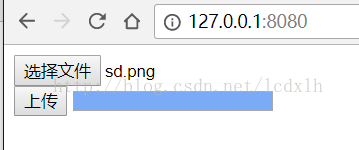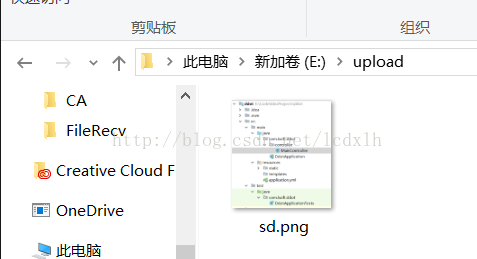之前在使用springboot进行文件上传时,遇到了很多问题。于是在翻阅了很多的博文之后,总算将上传功能进行了相应的完善,便在这里记录下来,供自己以后查阅。
首先,是建立一个标准的springboot 的工程,这里使用的ide是intellij idea,为了方便配置,将默认的配置文件替换为了application.yml。

1.在index.html中进行文件上传功能,这里使用的文件上传方式是ajax,当然也可以按照自己的具体要求使用传统的表单文件上传。
|
1
2
3
4
5
6
7
8
9
10
11
12
13
14
15
16
17
18
19
20
21
22
23
24
25
26
27
28
29
30
31
32
33
34
35
36
37
38
39
40
41
42
43
44
45
46
47
48
49
|
<!doctype html> <html lang="en"> <head> <meta charset="utf-8"> <title>上传测试</title> <script type="text/javascript" src="js/jquery-3.2.1.min.js"></script> </head> <body> <input id="file" type="file" name="file"/> <br/> <button id="upload" onclick="doupload()">上传</button> <progress id="progressbar" value="0" max="100"></progress> <script> function doupload() { var fileobj = document.getelementbyid("file").files[0]; // js 获取文件对象 var filecontroller = "/upload"; // 接收上传文件的后台地址 // formdata 对象 var form = new formdata(); form.append("file",fileobj); // xmlhttprequest 对象 var xhr = new xmlhttprequest(); //为请求添加返回处理函数 xhr.onreadystatechange=function () { if(this.readystate == 4 && this.status == 200){ var b = this.responsetext; if(b == "success"){ alert("上传成功!"); }else{ alert("上传失败!"); } } }; xhr.open("post", filecontroller, true); //使用进度条记录上传进度 xhr.upload.addeventlistener("progress", progressfunction, false); xhr.send(form); } function progressfunction(evt) { var progressbar = document.getelementbyid("progressbar"); var percentagediv = document.getelementbyid("percentage"); if (evt.lengthcomputable) { progressbar.max = evt.total; progressbar.value = evt.loaded; percentagediv.innerhtml = math.round(evt.loaded / evt.total * 100) + "%"; } } </script> </body> </html> |
2.在maincontroller添加文件上传的api,并返回上传结果
|
1
2
3
4
5
6
7
8
9
10
11
12
13
14
15
16
17
18
19
20
|
@postmapping("/upload") @responsebody public string upload(httpservletrequest request, @requestparam("file") multipartfile file) { string path = "e://upload//"; string filename = file.getoriginalfilename(); system.out.println(filename); file targetfile = new file(path); if (!targetfile.exists()) { targetfile.mkdirs(); } file savefile=new file(path+filename); // 保存 try { file.transferto(savefile); return "success"; } catch (exception e) { e.printstacktrace(); return "fail"; } } |
这时,我们进行测试,就可以发现,文件上传已经完成了。


很多时候,我们在进行文件上传时,特别是向普通用户开放文件上传功能时,需要对上传文件的格式进行控制,以防止黑客将病毒脚本上传。单纯的将文件名的类型进行截取的方式非常容易遭到破解,上传者只需要将病毒改换文件名便可以完成上传。
这时候我们可以读取文件的十六进制的文件头,来判断文件真正的格式。
因为我们发现,在我们读取文件的二进制数据并将其转换为十六进制时,同类型文件的文件头数据是相同的,即使改变了其后缀,这个数据也不会改变,例如,png文件的文件头为“89504e47”。
首先,我们将文件的数据进行读取
|
1
2
3
4
5
6
7
8
9
10
11
12
13
14
15
16
17
18
19
20
21
22
23
24
25
26
27
28
29
30
31
32
33
34
35
36
37
|
public class fileutil { public static string getfileheader( multipartfile file) { inputstream is = null; string value = null; try { is = file.getinputstream(); byte[] b = new byte[4]; is.read(b, 0, b.length); value = bytestohexstring(b); } catch (exception e) { } finally { if (null != is) { try { is.close(); } catch (ioexception e) { } } } return value; } private static string bytestohexstring(byte[] src) { stringbuilder builder = new stringbuilder(); if (src == null || src.length <= 0) { return null; } string hv; for (int i = 0; i < src.length; i++) { hv = integer.tohexstring(src[i] & 0xff).touppercase(); if (hv.length() < 2) { builder.append(0); } builder.append(hv); } system.out.println(builder.tostring()); return builder.tostring(); } } |
然后在文件上传的api中进行调用
|
1
|
fileutil.getfileheader(file) |
这时候,我们只需要进行简单的字符串比对,判断调用的返回值是否为“89504e47”,就可以知道上传的是否为png文件。
下面看下 java 获取和判断文件头信息
|
1
2
3
4
5
6
7
8
9
10
11
12
13
14
15
16
17
18
19
20
21
22
23
24
25
26
27
28
29
30
31
32
33
34
35
36
37
38
39
40
41
42
43
44
45
46
47
48
49
50
51
52
53
54
55
56
57
58
59
60
61
62
63
64
65
66
67
68
69
70
71
72
73
74
75
76
77
78
79
80
81
82
83
84
85
86
87
88
89
90
91
92
93
94
95
96
97
98
99
100
101
102
103
104
105
106
107
108
109
110
111
112
113
114
115
116
|
import java.io.fileinputstream; import java.io.ioexception; import java.util.hashmap; /** * 获取和判断文件头信息 * * @author sud * */public class gettypebyhead { // 缓存文件头信息-文件头信息 public static final hashmap<string, string> mfiletypes = new hashmap<string, string>(); static { // images mfiletypes.put("ffd8ff", "jpg"); mfiletypes.put("89504e47", "png"); mfiletypes.put("47494638", "gif"); mfiletypes.put("49492a00", "tif"); mfiletypes.put("424d", "bmp"); // mfiletypes.put("41433130", "dwg"); // cad mfiletypes.put("38425053", "psd"); mfiletypes.put("7b5c727466", "rtf"); // 日记本 mfiletypes.put("3c3f786d6c", "xml"); mfiletypes.put("68746d6c3e", "html"); mfiletypes.put("44656c69766572792d646174653a", "eml"); // 邮件 mfiletypes.put("d0cf11e0", "doc"); mfiletypes.put("5374616e64617264204a", "mdb"); mfiletypes.put("252150532d41646f6265", "ps"); mfiletypes.put("255044462d312e", "pdf"); mfiletypes.put("504b0304", "docx"); mfiletypes.put("52617221", "rar"); mfiletypes.put("57415645", "wav"); mfiletypes.put("41564920", "avi"); mfiletypes.put("2e524d46", "rm"); mfiletypes.put("000001ba", "mpg"); mfiletypes.put("000001b3", "mpg"); mfiletypes.put("6d6f6f76", "mov"); mfiletypes.put("3026b2758e66cf11", "asf"); mfiletypes.put("4d546864", "mid"); mfiletypes.put("1f8b08", "gz"); mfiletypes.put("4d5a9000", "exe/dll"); mfiletypes.put("75736167", "txt"); } /** * 根据文件路径获取文件头信息 * * @param filepath * 文件路径 * @return 文件头信息 */ public static string getfiletype(string filepath) { system.out.println(getfileheader(filepath)); system.out.println(mfiletypes.get(getfileheader(filepath))); return mfiletypes.get(getfileheader(filepath)); } /** * 根据文件路径获取文件头信息 * * @param filepath * 文件路径 * @return 文件头信息 */ public static string getfileheader(string filepath) { fileinputstream is = null; string value = null; try { is = new fileinputstream(filepath); byte[] b = new byte[4]; /* * int read() 从此输入流中读取一个数据字节。 int read(byte[] b) 从此输入流中将最多 b.length * 个字节的数据读入一个 byte 数组中。 int read(byte[] b, int off, int len) * 从此输入流中将最多 len 个字节的数据读入一个 byte 数组中。 */ is.read(b, 0, b.length); value = bytestohexstring(b); } catch (exception e) { } finally { if (null != is) { try { is.close(); } catch (ioexception e) { } } } return value; } /** * 将要读取文件头信息的文件的byte数组转换成string类型表示 * * @param src * 要读取文件头信息的文件的byte数组 * @return 文件头信息 */ private static string bytestohexstring(byte[] src) { stringbuilder builder = new stringbuilder(); if (src == null || src.length <= 0) { return null; } string hv; for (int i = 0; i < src.length; i++) { // 以十六进制(基数 16)无符号整数形式返回一个整数参数的字符串表示形式,并转换为大写 hv = integer.tohexstring(src[i] & 0xff).touppercase(); if (hv.length() < 2) { builder.append(0); } builder.append(hv); } system.out.println(builder.tostring()); return builder.tostring(); } public static void main(string[] args) throws exception { final string filetype = getfiletype("d:\\ry4s_java.dll"); system.out.println(filetype); } } |
总结
以上所述是小编给大家介绍的springboot文件上传控制及java 获取和判断文件头信息,希望对大家有所帮助,如果大家有任何疑问请给我留言,小编会及时回复大家的。在此也非常感谢大家对服务器之家网站的支持!
原文链接:http://blog.csdn.net/lcdxlh/article/details/78777675

















